
It has been 7 years since Seoul National University declared globalization as one of the main innovation policies and thus has carried forward ‘The 2nd Globalization Plan’. Thanks to the active open-door policy and globalization plans, the number of the international exchange/visiting studetns has been stabilized over 1,300 and the opportunities for the Korean students to stage out overseas have also been expanding through ‘SNU in World’ programs. According to the QS World University Rankings, SNU’s global ranking has climbed up 15 stairs from the 50th in 2010 to the 35th in 2016.
However, international faculty members who were attracted by such high global ranking have been leaving SNU, disappointed by bad study environments and the number of the international regular full time students rather tends to be declining. 「The Chosun Ilbo」 reported that the international professors who were employed by SNU have been leaving for the other competitor universities because of the low wage and the research environment falling behind. And the number of undergraduate full-time students has fallen down by nearly 40.
Thus 『SNU Press』 invited SNU international members to hold a discussion session and hear their thoughts on the problems and sustainable solutions of SNU globalization. The participants consist of 5 foreigner members who were invited from the international communities on campus such as SNU Buddy, Graduate School of International Studies, and SNU International Faculty Association etc. They, who have been the international members of SNU for a semester or more, said that the university has a lot of problem here and there, which people cannot read from the excellent quantitative indicators.
Participant Panels
△Prof. David Wright(Archaeology & Art History): SNU International Faculty Association organizer, SNU faculty member since 2010.
△Prof. Olga Fedorenko(Anthropology): SNU faculty member since 2015.
△Benjamin Buttigieg(Business Administration·16): exchange student, Economics major, Newcastle University Business School, UK.
△Benjamin Cartier(International Studies·16): Vice-Representative of International Area Studies, GSIS Student Council.
△Tom Norris(International Studies·16): Representative of International Cooperation, GSIS Student Council.
*The contents of the discussion are reorganized by the reporter according to the editorial directions and for the legibility, based on the actual comments during the meetings.
*You can also read this article in Korean on the newspaper #1943 or website(www.snunews.com).
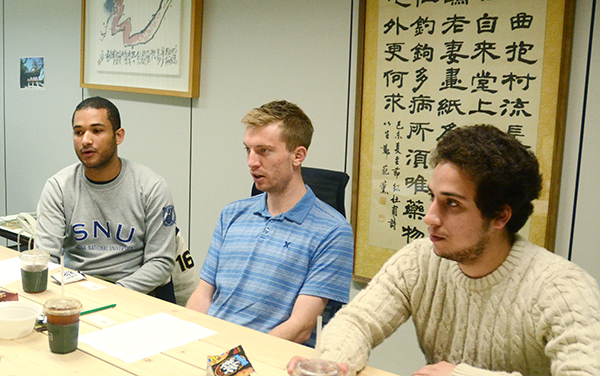
1. Are we really part of the SNU family?
Whether the Korean members accept foreign members as a part of their ‘family’ is a different matter from the university accepting the numerous foreign staff and students. The foreign members who participated in the discussion session all agreed that they “still feel excluded.” It seemed that they felt less integrated due to the exclusive atmosphere of the Korean members as well as the structural distinction by the university. The participants mentioned the following as the cause of this problem : △Exclusive academic traditions △Difference of interests between Koreans and foreign members △Exclusion in the process of decision making △Unintegrated student society structure.
Reporter: When do you feel excluded as a foreign member of the university?
Olga Fedorenko(Fedorenko): Since many Korean professors of SNU have done their bachelor and graduate school here at SNU, they are already well aware of the school culture and the network within. However, we know nothing of the school history, culture or the ambience.
Benjamin Buttigieg(Buttigieg): A lot of people think that foreign students did not come here to study. For instance, I was studying with some of my friends right before Christmas break last year and I complained about how stressed I was, but my Korean friends complained back that my grades were not important since I was an exchange student. It goes the same with team projects. Foreign students are often excluded from the main part of the project as their grades are considered not important. In general, people think that exchange students came to SNU not to study but just to have fun.
Tom Norris(Norris): Many Korean students are reluctant about communicating fondly with foreign students because they are believed to be leaving soon, even if they are full-time students. I have to explain every time that “I am staying here in Korea for a long time because I am a full-time student.”
Reporter: Do you feel that the foreign and the Korean student communities are well integrated?
Norris: The life in SNU can be very different depending on which community of the two that one belongs to. For GSIS students, the two student bodies seem to integrate with one another in the beginning but naturally end up separated. As a member of the student council, one of our biggest concerns is the integration of Korean and foreign students.
Buttigieg: The foreign students should at least be given the choice of which student group to belong to. It is great that there are communities such as SNU Buddy where foreigners and Koreans can mingle. However, it is impossible to meet Korean students in each department who do not participate in these communities. It is difficult for foreign students to feel that they are part of the department or the class system. We do meet Korean students in classes, but they already know each other from events held by the department so it is hard to fit in. The foreign students should at least be given a chance to be officially introduced to the Korean students of the department. This kind of opportunity is indispensable for exchange students to have experience that makes us really interact with Korean students.
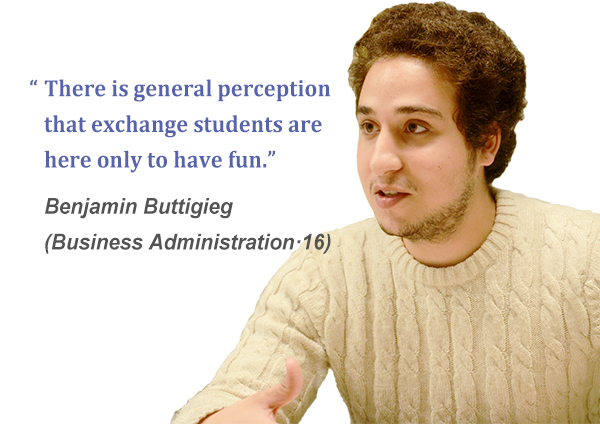
2. We need a way to leap over language barriers
Language barriers are a chronic problem that inteferes with globalization. The university is consistently making various efforts to break down the walls, but the language barrier is still a big problem for the foreign members. Solutions such as education of the Korean language for academic use as well as expansion of financial support for language programs have been mentioned for fundamental resolution of the problem. Currently there are programs for the education of the Korean language for foreigners, such as the Korean Peer Tutoring program of the Faculty of Liberal Education and the Korean language learning program of the College of Humanities International Office. However, there is a lack of promotion for these programs.
Reporter: The language barrier seems to be pointed out as the ultimate reason for which Koreans and foreigners cannot integrate with each other. How do you think this problem can be solved?
David Wright(Wright): There needs to be some kind of an incentive from the university that encourages foreign members to learn Korean. In Sweden, it is mandatory to learn Swedish for two years and pass a test in order to study or do research in a university. There is no problem with this because the university provides all the necessary courses. When someone spends a certain period of time to learn a language, it is natural that the person will want to stay in the language-speaking country and continue their research there. Learning the Korean language itself will make people want to settle here. The university needs to propose high incentives such as advantages in promotion when one takes a language course.
Fedorenko: Inter-University Center at Seongkyunkwan University opens Korean language courses for academic and professional needs. On the contrary, the Korean Language Education Center at SNU LEI opens Korean language courses that focus only on everyday language. Most foreign faculty and researchers are looking for more professional, practical and academic Korean that can be applied directly to their studies.
Norris: The cost of the Korean language courses at SNU LEI is very high, but financial support is available from SNU Global Scholarship. However, more promotion and support is necessary as not many students are aware of the fact that such aid exists.
Reporter: Other than foreign students learning the Korean language, the Korean members learning and using English could be another option. What are your opinions on this solution?
Norris: I have heard that some courses in the College of Engineering are marked as English courses on the syllabus, but they are actually taught in Korean and students who do not understand are to raise their hands. A friend of mine who took a class like this had difficulties with understanding the material, so he had to voice-record the whole lecture and translate it later in order to understand and study. If a course is marked as an English course, it must be taught in English. Another problem is that there are not many English courses in the first place. There should be more classes taught in English, and advantages should be given to Korean members who take courses in English. Another considerable option is having a bilingual campus as other great universities do in Singapore, Hong Kong, Germany and many other countries in Europe and Asia. SNU needs to benchmark such policies.
Benjamin Cartier(Cartier): In my opinion, a bilingual campus is not completely necessary. A global university is not only about sending more Korean students abroad; it is rather about creating more global opportunities within the campus. Korean students will be more confident in English just by communicating with numerous foreign members on a regular basis.
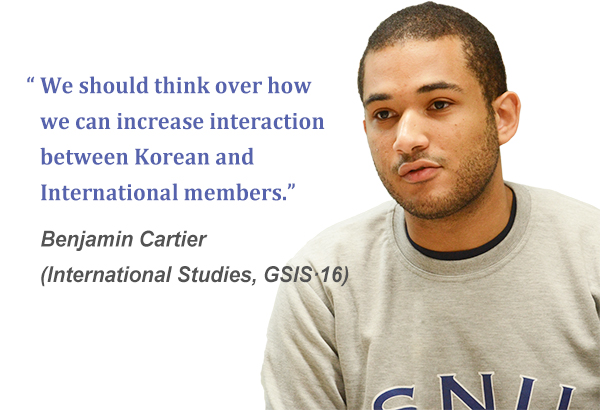
3. Careless administration system is too hard even to enter
Even Koreans often struggle with complex administration system. Most online systems including MySNU are supported in English, but small consideration for international members still lacks. What has been pointed out were △Lack of support for the administrative affairs that the OIA is not in charge of △Use of document format that is not compatible abroad △Complex and too much procedures △Some online systems that are not still bilingual.
Reporter: Have you ever felt that SNU administration is too complicated or hard to deal with?
Fedorenko: I feel that we have limited chance to acquire research budgets. I have spent many hours with my assistant because of the paperworks and administration affairs. Even just entering the system was so hard that I thought myself that I would rather spend my own money for the research. I wish I could spare more time for my research, not the paperworks.
Wright: I am satisfied with the generous funding. SNU lets us use enough budget for inviting the renowned scholars to the conferences, even better than other famous universities overseas. Yet ‘One-Stop Online System’, which is for the managing all the publishing, research, and conference matters, is not fully translated in English and so complicated that makes it hard for foreign members to get such good opportunities. I cannot either understand the notices on many boards or e-mails in JPEG file format. They should be in text format so that we can at least use translator. If they are image file, we cannot even know that the information is valuable or not. I am not asking for all the notices bilingual, just a small consideration for international members.
Cartier: There are a lot of paperworks or administration requirements that are to be done before we arrive in Korea, and I think they should be notified earlier. Some file formats are not compatible on computers in other countries such as hwp. Requiring too much papers for trivial works is also a problem. For instance, I need to get a paper signed just to reserve the dorm soccer field. The online reservation system for it is still only in Korean, always saying ‘coming soon’.
Norris: We need to submit a lot of papers that we do not understand why. I had been back home for the last Christmas holidays and they required me to retake the chest X-ray examination and submit it for extending the dormitory. The dorm health check-up policies insist the students take it every six months, but I do not know the reason behind for retest even if we have lived in dorms without any health-related issues a semester just before. Requesting those test results when most international students are back home countries during the holidays seems not also very considerate. I had to take X-ray exams at extraordinary expense because it is not as cheap in the United States as in Korea.
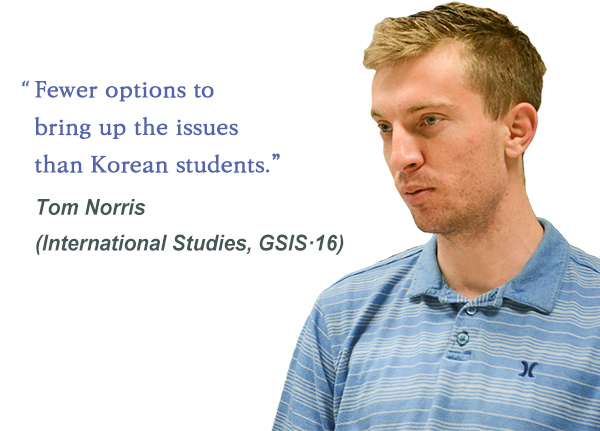
4. We feel helplessness everywhere on the campus full of discrimination
Discrimination due to the fact of being a ‘foreigner’ is spotted all over the campus. Professor Fedorenko has suffered a sexist harassment on campus last October and has made this a public issue through by posting an open letter online. Several media covered this incident but the university has not really reacted nor come up with a solution afterwards. Also, a guideline for human rights has been drafted, but foreign members are not aware of the existence of this guideline. Many did not know how to take advantage of the Human Rights Center or how to report to the Korean police, neither. Housing policies including the new dormitory for foreigners in construction seem to be reconsidered.
Reporter: Do you feel safe on campus? Have you ever experienced any kind of discrimination as a foreigner?
Buttigieg: I have seen many students who could not complain about things they would have in their home country. Taxi drivers refusing passengers and people coming up for evangelism are all examples of discrimination and harassment. However, we try to ignore and not complain most of the time because we do not know how to bring up those kinds of issues officially.
Norris: Last semester, local police officers came to OIA to explain in English the reporting procedures and also to hand out their cards. It would be much more helpful if this kind of information was available online. There are many people who do not even know that the Human Rights Center on campus exists. Human rights education is mandatory in the GSIS; such education should be more accessible and public for foreign members.
Reporter: The ‘International Dormitory’ that will accommodate 1,000 people has been under construction since last year, and might be welcoming students next year. What are your opinions on this dorm?
Norris: Having more residential space is a good thing, but I am doubtful about the division of foreign students. The international dormitory is located farther than the original ones, which will lead to less interaction between Korean and foreign students. I have stayed at a foreign dormitory at Yonsei University before and the facilities were great. However, there was zero interaction with Korean students. There should be a dormitory where the two parties can merge together, rather than a foreigner-only dormitory.
Buttigieg: It seems like a strategy to attract more foreign students, but at the same time separate them from Korean students. There is an internatioal dormitory in my home university as well, but students have the choice to apply for this dorm or not. It is usually the Muslim students who stayed there often due to the drinking culture difference. It would be nice if SNU gave us the choice like this. A lot of times Korean students can help foreign students when, for example, ordering food or looking for something lost. In a foreigner-only dormitory, it would be difficult to have this kind of help easily.
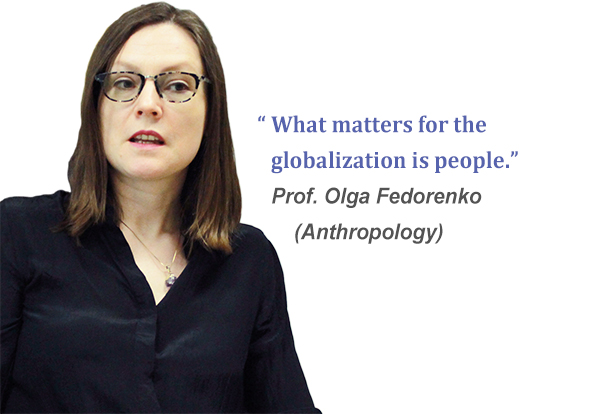
5. How will you embrace the world, Siheung Campus?
From the year 2007 when they conceive of the plan of multi-campus until now, the general establishment guidelines for Siheung Campus have always included ‘globalization’, such as the words like ‘international, global, leading the world, and contributing to the international society’. Yet the international members were not aware of this issues nor the corresponding movements of the student society. As long as the new campus pursue globalization, we cannot exclude the foreign members but SNU and student society appear not recognizing any necessity to include them in this argument. The panels all agreed on the fact that we need more practical and specific strategy for globalization rather than just constructing the new buildings.
Reporter: Siheung Campus is discussed for such long time withing the SNU student society. Have you ever heard about this issue?
Norris: If you are an international student, you would feel that you are detached from these kinds of campus issues. It feels like that we do not have to care about the issues because we are foreigners and only staying here shortly.
Cartier: I have recognized that the student rallies are so huge related to Siheung Campus issue, but that is all. I know that many student units have joined these rallies and spoke out their voices, yet these kinds of information never coverd GSIS.
Reporter: Siheung Campus has included globalization in the main guidelines. I would like to know your thoughts about this.
Norris: Open education and globalization is very welcoming, still I doubt how they can realize it specifically. They pushed forward the similar things and there were resistance by the students in Yonsei or Ehwa. It will rather devalue SNU’s brand if we are not ready for being more internationalized than here in Gwanak.
Cartier: There is small correlation between a new campus and globalization. It is still possible here. And I do not like seperated campuses. If you look in to Kyung Hee University’s case, their global campus is in Suwon but I do not feel it really enhances the value of them. We need to accept critically the expansion examples of the European colleges.
Buttigieg: Almost every European university is doing similar expansion. My home university also has campus on London and Malaysia. It is all about making more money after all, and there is serious gentrification on the new campuses. SNU is leaving Seoul for the smaller city, and I am not sure if the students would feel attracted. There have to be some incentives as lowering the tuition or housing expanses.
Wright: Simply buying new areas and building a new campus do not guarantee globalization. We need more specific plan how to globalize. The new campus itself cannot be the strategy for it. Practical policies and strategies are needed.
Fedorenko: The Uni wants it, but the students do not; that is all I know. There is not much information for international members. I do not agree with the argument that Gwanak Campus is already overpopulated. Many people criticized the Incheon Global Campus of Yonsei’s and a few scholars have wrote about this. They said the campus isolated as if it is not even in Korea. What matters is not the buildings, but what the people actually does inside them. Who realizes the globalization is people, not the buildings.
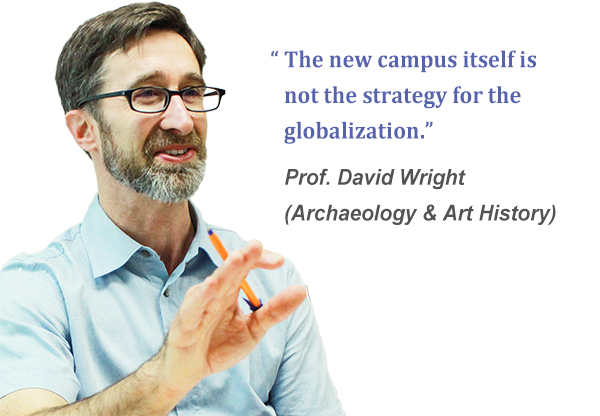
Stable globalization as the world top universities is not short-term achievement. However as several people pointed out in this discussion, SNU needs a whole new direction for the policies. Most international members do not want major changes in the policies. Rather, they want small consideration to listen carefully to what they say in such minor parts. That considerate action starts from realizing that the international members are already ‘us’, same as the Koreans, before it’s too late.
Photograhphy: Yujin Jeong, Photography Reporter, tukatuka13@snu.kr
Illustration: Eunhee Lee, Illustrator, amon0726@snu.kr
